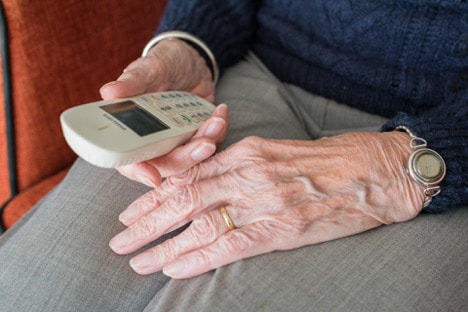Understanding that these encounters are exceedingly tough to navigate in person, we must also evaluate how we can cover our bases when loved ones are far away. How do we handle strenuous situations from afar when it's hard enough to master in person?
To discuss some ideas, we are welcoming Ms. Claire Wentz of Caring from Afar!
It can be extremely difficult to be a caregiver to someone you love when you live in different states. However, many adults are unable to move closer to an aging parent or relative. Fortunately, with a little help from technology and a great support team, you can ensure your senior loved one is happy and healthy. Here’s what you need to know:
Get Connected with the Right Phone
To stay connected with friends, family, and medical providers, your loved one must have a reliable, easy-to-use phone. For example, if your loved one prefers flip phones, then opt for something like the LG Exalt LTE, which still offers functionality such as texting and calling. For seniors who want the power of a smartphone, the Samsung Galaxy J3 V 3rd Gen is the way to go. There are also a number of accessories that will help seniors enjoy their phones.
Evaluate the Home for Safety
Even if you are not residing in the immediate area of your senior parent or loved one, you need to check that the home is safe and secure. If they are living independently, visit their home and make sure it’s had all the necessary renovations, including doorways widened and ramps installed for wheelchairs. It should also feature bathroom modifications, such as shower chairs, walk-in tubs, and safety bars. Adequate lighting is vital throughout the home to help avoid falls. The right home improvements can help ensure a senior will be able to age in place at home where they are comfortable and familiar. An easy-to-use security system is also essential.
If your loved one is residing in assisted living or a nursing home, it’s also important to visit the facility as well. Talk to the staff about everything from meals to medication and visiting hours to social activities. Schedule regular conference calls with any doctors and staff to get up-to-date information about your loved one’s health and well-being.
Arrange for In-Home Care if Necessary
For those aging in place, you may need to arrange for in-home care on a part- or full-time basis. Get local referrals from friends and doctors, or use a caregiver service to find the right person for the job. Even if your relative doesn’t need in-home care quite yet, you may want to consider hiring an aging life care professional or geriatric care manager to evaluate their unique situation. These providers are licensed nurses or social workers who can evaluate senior’s needs and coordinate necessary services needed.
Get Local Assistance
If the older adult has no relatives in the immediate geographical area, enlist the help of neighbors, church members, and others nearby to keep an eye out on your loved one and notify you immediately if any issues arise. When your parent or family member is living alone and begins to have difficulties with daily living activities, such as preparing meals, toileting, or bathing, then it may be time to consider assisted living or a nursing facility. These types of facilities can provide assistance with daily activities, as well as access to medical care, transportation, social activities, wellness programs, and other amenities.
If circumstances prevent you and your aging parent or relative from living in the same city, it can be difficult — but not impossible — to make sure they get the care they need. Visit as often as you can, touch base on a daily basis by phone or video chat, and enlist the help of local caregivers, medical providers, neighbors, and friends. It will take research and dedication, but you can keep your loved one happy and healthy from afar.
Photo via Pixabay


 RSS Feed
RSS Feed